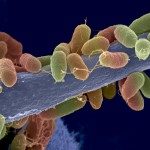Lien vers Pubmed [PMID] – 24023936
PLoS ONE 2013;8(9):e74326
Several studies in mouse model of invasive aspergillosis (IA) and in healthy donors have shown that different Aspergillus antigens may stimulate different adaptive immune responses. However, the occurrence of Aspergillus-specific T cells have not yet been reported in patients with the disease. In patients with IA, we have investigated during the infection: a) whether and how specific T-cell responses to different Aspergillus antigens occur and develop; b) which antigens elicit the highest frequencies of protective immune responses and, c) whether such protective T cells could be expanded ex-vivo. Forty hematologic patients have been studied, including 22 patients with IA and 18 controls. Specific T cells producing IL-10, IFN-γ, IL-4 and IL-17A have been characterized through enzyme linked immunospot and cytokine secretion assays on 88 peripheral blood (PB) samples, by using the following recombinant antigens: GEL1p, CRF1p, PEP1p, SOD1p, α1-3glucan, β1-3glucan, galactomannan. Specific T cells were expanded through short term culture. Aspergillus-specific T cells producing non-protective interleukin-10 (IL-10) and protective interferon-gamma (IFN-γ) have been detected to all the antigens only in IA patients. Lower numbers of specific T cells producing IL-4 and IL-17A have also been shown. Protective T cells targeted predominantly Aspergillus cell wall antigens, tended to increase during the IA course and to be associated with a better clinical outcome. Aspergillus-specific T cells could be successfully generated from the PB of 8 out of 8 patients with IA and included cytotoxic subsets able to lyse Aspergillus hyphae. Aspergillus specific T-cell responses contribute to the clearance of the pathogen in immunosuppressed patients with IA and Aspergillus cell wall antigens are those mainly targeted by protective immune responses. Cytotoxic specific T cells can be expanded from immunosuppressed patients even during the infection by using the above mentioned antigens. These findings may be exploited for immunotherapeutic purposes in patients with IA.



